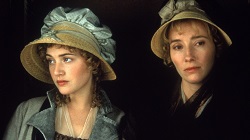Well, who are you? I’m of the belief that we’re all one of Jane Austen’s characters and, heaven knows, there are enough online quizzes to bear this out. Only Sense & Sensibility, however, gives us two heroines from which to choose, and they couldn’t be more different. I think that we all have a little bit of either Elinor or Marianne in us (or possibly both). Literary criticism, in general, has signed the traits of sense and sensibility to Elinor and Marianne, respectively.
The cult of sensibility was a late 18th century social construct that was characterized by the exaggerated expression of emotion. So Marianne. The Marianne whom we first meet in Sense & Sensibility is all sensibility. After Willoughby leaves Allenham, Marianne indulges in every symptom of sentimentality associated with sensibility.
When breakfast was over, she walked out by herself, and wandered about the village of Allenham, indulging the recollection of past enjoyment and crying over the present reverse for the chief of the morning.
The evening passed off in the equal indulgence of feeling. She played over every favourite song that she had been used to play to Willoughby, every air in which their voices had been oftenest joined, and sat at the instrument gazing on every line of music that he had written out for her, till her heart was so heavy that no farther sadness could be gained; and this nourishment of grief was every day applied. She spent whole hours at the pianoforte alternately singing and crying; her voice often totally suspended by her tears. In books, too, as well as in music, she courted the misery which a contrast betwen the past and present was certain of giving. She read nothing but what they had been used to read together.
Such violence of affliction indeed could not be supported for ever; it sunk within a few days into a calmer melancholy; but these employments, to which she daily recurred, her solitary walks and silent meditations, still produced occasional effusions of sorrow as lively as ever.
Elinor, on the other hand, is all sense, the embodiment of early 18th century rationalism. It is Elinor who takes charge when the Dashwoods must leave Norland and gets them moved and settled at Barton Cottage while Marianne mourns the loss of “dear, dear Norland.” It is Elinor who worries about Marianne’s emotional attachment to Willoughby and who tries to talk sense into both Marianne and her mother. It is Elinor who confronts Willoughby when he calls during Marianne’s illness. And, although Elinor is also nursing a broken heart, she never wallows in melancholy, but gets on with what must be done.
The conversation that, perhaps, best exemplifies these two personalities occurs in Chapter 16:
“Dear, dear Norland,” said Elinor, “probably looks much as it always does at this time of year. The woods and walks thickly covered with dead leaves.”
“Oh!” cried Marianne, “with what transporting sensations have I formerly seen them fall! How have I delighted, as I walked, to see them driven in showers about me by the wind! What feelings have they, the season, the air altogether inspired! Now there is no one to regard them. They are seen only as a nuisance, swept hastily off, and driven as much as possible from the sight.”
“It is not every one,” said Elinor, “who has your passion for dead leaves.”
The wages of sensibility


I’m Marianne on the inside and try to be Elinor on the outside. I think that’s the brilliance of the book in that one can relate to both.
Elinor. So very Elinor.
Marianne but with a desire to be like Elinor
When I was a teen and in my twenties, I was Marianne…but now I think I am totally Elinor. Thankfully!
When I was in my teens I wanted to be Marianne. I have no idea why now looking back and understanding her character more. I think I have more of Elinor’s sense and practical reasoning or at least more than I had back in my teens, yet still the feelings of Marianne inside me. I think Elinor is an underlooked herione compared to Austen’s Elizabeth Bennet who although quiet and slightly dull gets her hero in the end.
Marianne has always irritated me… not that I don’t have my emotional moments but definitely I’m an Elinor.
I’m quite sure when I was a teenager I was Marianne, but I’ve been Elinor for years now.
Lovely post. I tweeted.
We get to indulge in being Marianne when we are young and full of energy and vivacity, and have little of vital importance to do. We need to become Elinor when we are old enough that being Marianne gets in the way of what needs to be done, and is just too exhausting and time-consuming to maintain. 😉
I am most definitely an Elinor.
Definitely Marianne. I used to be Elinor,but switched from being a scientist to being an artist. I am not as EXTREME as her though.
I am Elinor. And, like I imagine Elinor of P&P to be, I have all of Marianne’s feelings inside, but I control them because things do need to be done.
Hmmm. This is a tough one. When I was younger and especially when I was singing I was definitely Marianne, but I think I had to be. These days I try very hard to be Elinor in my every day life – the job, the finances, etc, but I try to call up my inner Marianne when I am writing.
[…] continuing Myretta’s Jane Austen theme […]